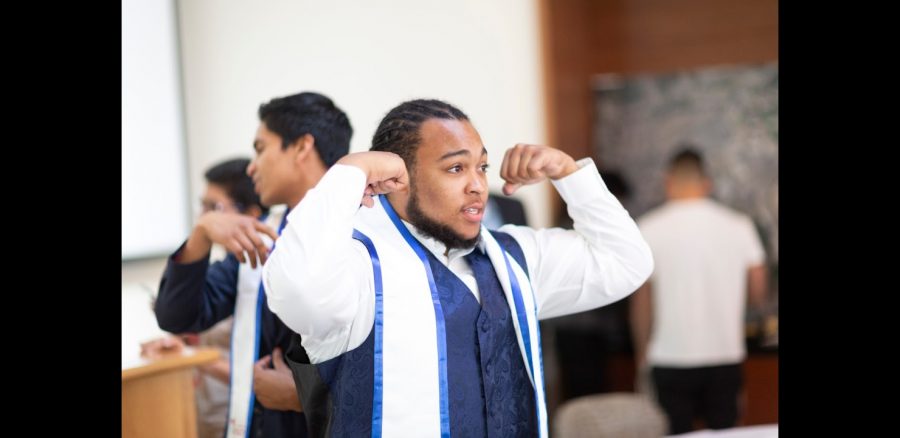When you see him, he is either smiling or cracking a few jokes. Easily recognized, he is constantly being greeted by students, faculty and fellow teammates. Although it may appear he is truly comfortable in his skin, he struggled with identity and where he fits in the black community.
Robert Sadai Alexander, 21, is an active student at Mt. SAC. He works on campus for the REACH program – Reaching, Empowering, Achieving & Completing with Heart. Alexander is a part of various other programs too, such as ARISE, Aspire, ACES, Male Minority Initiative and the Honors Program. Alexander also played for the football team at Mt. SAC.
Alexander attended four different high schools to follow his dream of playing football. He graduated from Junipero Serra in Gardena with hopes of playing at a higher level. His journey at Mt. SAC began in 2015 when he was recruited to play for the Mt. SAC Mounties.
“High school was a pretty miserable experience, with me always moving,” Alexander said. “I was always the new kid.”
Alexander was extremely involved in high school. He was on the chess team, wrestling team, jazz band and debate team. He played football, volleyball and also acted in theater.
“The one thing I do regret about high school is that I pursued football instead of acting,” Alexander said. “I pursued football because I was good at it, but I was actually in love with acting. It’s one of those great white buffalos that got away.”
Alexander also came to Mt. SAC to escape violence at home. During the summer of 2015, a Los Angeles gang war broke out, continuing for 100 days. To keep Alexander safe, his mom wanted him to go to a school that was far from Los Angeles.
“It was a very violent time, so my mom pushed me to go away and out of the city,” Alexander said. “So, I came from Los Angeles to play football, but I stayed for the academics.”
Alexander is the first in his family to go to college, and his time at Mt. SAC has been a rollercoaster.
“My experience here has been fun, exciting, and new,”Alexander said. “But it also has been very scary because in my close immediate family, no one else is going to really get what I have been going through.”
Although he said his family was his biggest support system, he still felt like he was on his own. It wasn’t until he joined programs such as the Male Minority Initiative, ARISE, and ASPIRE that he was assured he was not alone.
These programs had people that looked like him and endured similar obstacles. Male Minority Initiative, a program to help assist the educational success of minority males, was the catalyst to his success.
Aside from feeling alone, Alexander also had issues with identity at Mt. SAC. As an African-American, he has experienced numerous instances of discrimination throughout his life. He also had a hard time understanding where he fit into the black spectrum.
“It really sucks when you realize that you are classified as a secondary citizen because of the color of your skin,” Alexander said.
At the age of 18, Alexander’s home was raided by the police. Without any warrant, they tore up his house and handcuffed him tightly. Alexander remembers one officer in particular who kept staring him down. While the officer was watching him, Alexander noticed that the officer kept his hand on his gun throughout the search. In that moment, Alexander realized that the officer saw him as a threat.
“That was when I realized that some people see me as a threat when I’m just the nicest guy,” Alexander said.
Alexander also recalled a moment on an elevator when he saw from the corner of his eye, a white woman gripping her purse a little tighter while slowly moving away. He assumed it was because of his size but he notices the discrimination when he greets people and they immediately walk in the other direction.
“I get tired of it because I just want people to see me for my actions, my heart, my good will and my good intentions other than my skin color,” Alexander said. “I am more than just a problem.”
Issues of identity continued at Mt. SAC.
“There have only been two or three classes where I wasn’t the only black person in the room,” Alexander said. “It felt weird. I started to question if I even belonged here.”
That was when he joined the Aspire program. Aspire provides support and assists with the educational success of African-American students. The program provided a safe space for Alexander to openly talk about his experiences and not feel alone. It was also the help of his mentor, Clarence Banks, that kept him grounded.
Alexander turned challenges into a purpose.
“I’m going to be a trail blazer. I’m going to be the first in my family to set things right, to venture into uncharted territory like colleges,” Alexander said. “What I want to do is set my mark in a PWI [predominately white institute] and just work from there.”
Alexander will be graduating this year with an associate degree in kinesiology. He plans to attend University of California Davis in the fall, majoring in African-American studies and fire science. Alexander will also minor in gender and ethnic studies.
Alexander was motivated to not only learn about the history of his people, but to see what he can do to contribute to the black community.
“I want to say I succeeded in that environment. I might’ve struggled a little bit, but I would be able to say that I did it,” Alexander said. “Therefore, I can say we did it. I’m just one of these guys that just can’t quit.”


